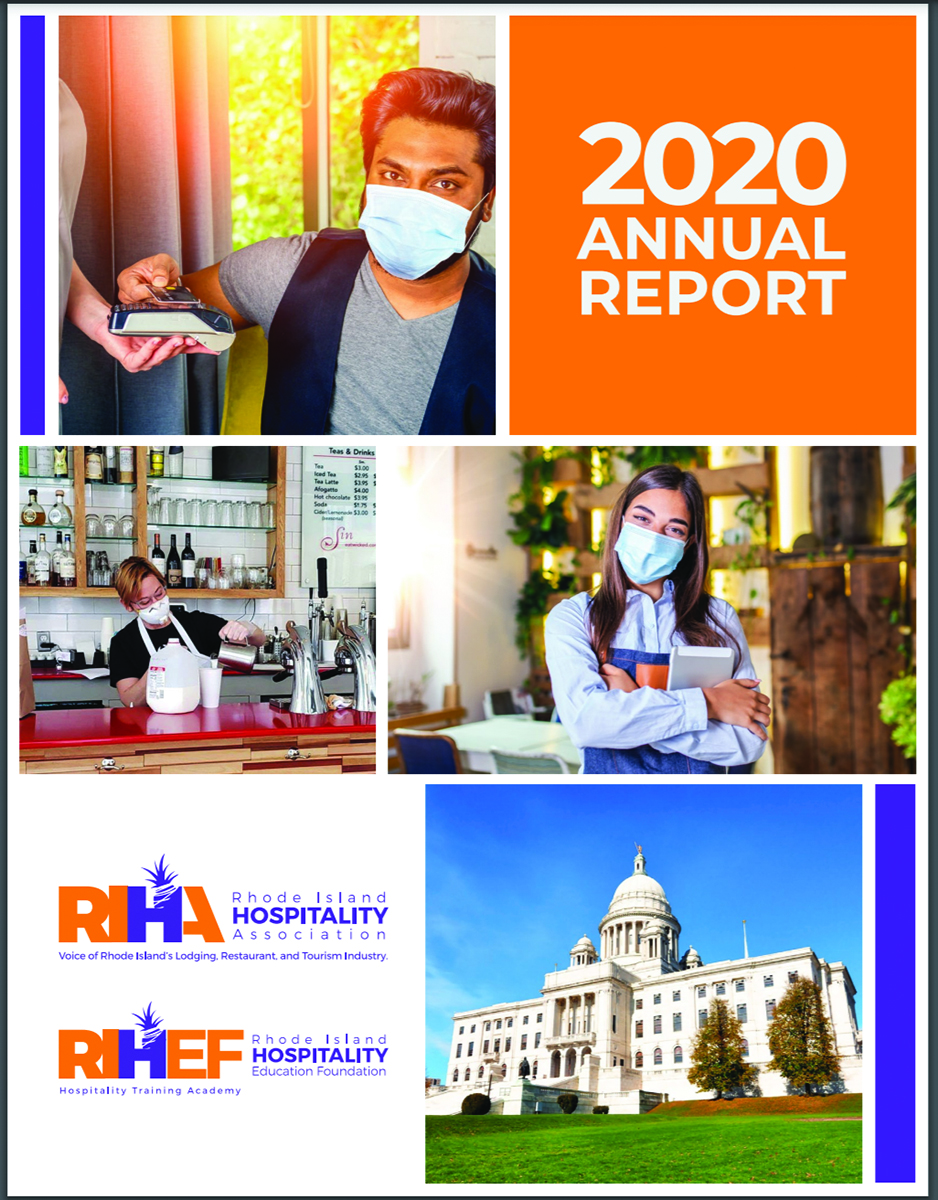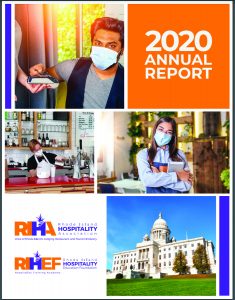
 Annual report outlines market successes
Annual report outlines market successes
From Staff Reports
During an average year, the Rhode Island Hospitality Association’s (RIHA) mission to support its hospitality-industry members through advocacy efforts, communication and education is filled with a host of activities from state and federal lobbying to seminars, classes and outreach.
Then in March 2020, RIHA began its multitiered response to the unprecedented health and economic crisis brought on by the coronavirus pandemic: navigating and communicating the mandated shutdowns and restrictions; creating aid outlets for bars, restaurants and hotels and its workforce though funding initiatives; converting training and educational programs offered through the RI Hospitality Education Foundation (RIHEF) to a virtual format; establishing the RI Hospitality Employee Relief Fund to provide stipends for those put out of work; and providing resources and information about grants and government funding as it became available.
A summary below recaps the efforts.
Spring and Summer 2020
On March 9, 2020, Gov. Gina M. Raimondo declared a state of emergency in Rhode Island, a week after the first Rhode Island patient was diagnosed with COVID-19. The closure of dine-in service for all restaurants followed on March 16 and a stay-at-home order was issued on March 28. RIHA launched an informational COVID-19 page on its website and began sending out daily brief emails and holding weekly RIHA Industry Meeting calls. RIHA immediately began working with the governor’s office, enabling restaurants to continue to offer takeout and delivery services and creating a reopening plan for when on-premise dining would again be allowed. RIHA also worked with the governor’s office to give restaurants permission to sell alcohol to-go with takeout food orders, with beer and wine permitted to be sold with carryout.
Restaurants and bars remained closed for on-premise service. On April 27, 2020, Gov. Raimondo announced a four-phase reopening plan for the state. RIHEF launched its RI Hospitality Employee Relief Fund to provide grants to workers who lost work amid the impacts. As of April 2021, more than 665 people have received assistance through the fund for basic living expenses such as mortgage and rent payments, utilities, groceries or medical bills. RIHA partnered with the RI Department of Health to define food-safety guidelines on takeout and delivery services, including use of face coverings and gloves, cleaning and sanitizing protocols.
Continued advocacy for to-go cocktails with takeout food orders was a win for May. Legislation to keep the to-go alcohol program in place until the end of 2022 is currently before the General Assembly. The stay-at-home order expired on May 8 and restaurants were given the OK to open for outdoor dining on May 18. RIHA distributed personal protective equipment to industry members through a partnership with Commerce RI and free hand sanitizer donated by Sons of Liberty Beer & Spirits Co. As phase two reopening guidelines were announced, RIHA launched the RI Restaurant Pledge and American Hotel & Lodging Association Safe Stay Hotel Pledge, giving restaurants and hotels a way to inform customers they would operate conscientiously. RIHA also worked to create Reopening Toolkits to navigate health and safety protocols as businesses reopened. Restaurants were allowed to offer indoor dining with contact-tracing protocols, capacity limits, and social-distancing and masking requirements in place beginning on June 1, 2020.
Fall and Winter 2020
Anticipating cooler temperatures, RIHA launched its Take It Outside initiative, with the goal of highlighting and extending comfortable outside dining. RIHA kicked off the program with its #BYOBlanket campaign on Oct. 19, 2020, providing 500 outdoor heaters and 12,000 blankets to state restaurants, along with thousands of hand warmers and pieces of PPE. RIHA partnered with Ocean State Job Lot to purchase the blankets and hand warmers with funds through a Take It Outside grant from Commerce RI, among the many jointly touted and newly created aid efforts.
As a significant increase in Rhode Island’s COVID-19 case positivity rate flared in November, Gov. Raimondo placed the state under a three-week “pause” beginning on Nov. 30, 2020. Residents were only allowed to gather with people from their own households and restaurants were allowed to remain open for indoor and outdoor dining at 33% capacity with a curfew of 10 p.m. Bars and bar service remained closed, along with indoor catered events and recreation. To help offset the additional financial burden, RIHA worked with the state to procure grants for restaurants of up to $10,000.
RIHA then pushed for further economic relief for businesses dealing with the impact of the three-week “pause” period, resulting in grants of up to $50,000 for affected businesses. Through the Commerce RI Take It Outside program, RIHA gave $420,000 of reimbursements to small businesses, including restaurants who spent money on adapting and creating outdoor-dining spaces under COVID regulations.
Winter and Spring 2021
Through the winter months, RIHA continued to work to provide its members with grant funding. In December, RIHA provided Commerce RI Engagement, Service, and Resiliency Grant funding to small businesses through a partnership with the Providence Warwick Convention & Visitors Bureau.
The curfew imposed on businesses and restaurants was lifted on Jan. 29, 2021, while other restrictions remained in place. In January 2021, RIHA rolled out a COVID-19 testing program for hospitality employees in partnership with the RI Department of Heath using the BinaxNOW rapid test. RIHA also advocated for hospitality and tourism industry employees to be designated as “critical industry” employees, to be able to receive quick access to the coronavirus vaccine.
In February, two households per table were allowed to be seated together for indoor dining and bar seating was reopened for the first time since the November “pause.” As spring began, the limitations placed on indoor and outdoor dining were eased. Capacity limits in restaurants increased to 75% occupancy on March 19 and spacing between tables was reduced on March 12 from eight feet to six feet. Also in March, catered events were capped at 75% capacity, for a maximum of 100 allowed indoors and 200 allowed at outdoor events. The private social gathering limit was increased to 15 people inside and 50 people outside.
In additional efforts to provide perspective, information and education, RIHA launched its industry podcast, #Wearehospitality, in February. The weekly podcast features interviews with local hospitality-industry leaders, educators and influencers. Listen to the podcast here: wearehospitality.buzzsprout.com.



